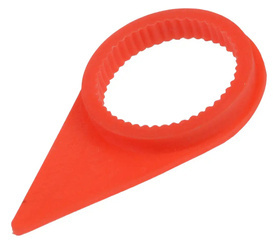
Checktorque indicators - 29mm
What is this?
These overlays are a connection of two loose nut indicators. Both are joined with a flexible tape to determine if the lugs are going to unscrew. If one of the nuts is moving in the wrong way, the tape will straight out, thus causing the wheel to stop turning.
Full security
Importantly, Checklink products prevent the nuts from loosening completely. They already lock loose pins, which means the risk of losing the wheel is practically eliminated.
How to install it?
Mounting nuts on wheels is very simple. Initially, install the screws with the right torque. Then, place your finger over the Checklink overlap on the adjacent wheel nuts. Remember that even the minimum movement of the nut is signaled by stretching or bending of the connecting tape, which is perfectly visible. After finishing the procedure, walk around the car to make sure that each of the pins is properly tightened.
Full security
Importantly, Checklink products prevent the nuts from falling off completely. They already lock loose pins, so the risk of losing the wheel is practically eliminated.
Excellent quality
Why choose Checkpoint overlays? Remember that these are not regular plastic components but rather a product made of a composite of the highest quality. Overlays retain their stiffness and durability throughout their service life - regardless of the weather conditions.
Don't forget!
With a special blend of polymers, the overlays can signal a variety of abnormalities in the operation of brakes, bearings or hubs, resulting in extremely high temperatures centered on the center of the wheel. The heat is also transferred to the fixing screws and then to the nuts, which in turn causes the bends of the tape connecting the gauges, which is easy to observe and allows early response and avoid further damage.
Why is it so important?
Remember that even if one pin looses, it is a significant risk on the road. All vertical, centrifugal and lateral forces and vibrations or shocks are unevenly distributed to the rest of the bolts, which in turn loosen with less overload. As a result, you may even get a wheel shift in relation to the hub, and in the extreme case to lose it.
Entity data
23-114 Jabłonna k/Lublina
Poland
sklep@redats.com
